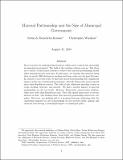Mayoral Partisanship and the Size of Municipal Government
Author(s)
De Benedictis-Kessner, Justin; Warshaw, Christopher S
DownloadMayoral partisanship.pdf (380.1Kb)
OPEN_ACCESS_POLICY
Open Access Policy
Creative Commons Attribution-Noncommercial-Share Alike
Terms of use
Metadata
Show full item recordAbstract
Does it matter for municipal policy which party controls the mayorship in municipal government? The bulk of the existing evidence says no. But there are a variety of theoretical reasons to believe that mayoral partisanship should affect municipal policy. We examine the impact of mayoral partisanship in nearly 1,000 elections in medium and large cities over the past 60 years. In contrast to previous work, we find that mayoral partisanship has a significant impact on the size of municipal government. Democratic mayors spend substantially more than Republican mayors. In order to pay for this spending, Democratic mayors issue substantially more debt than Republican mayors and pay more in interest. Our findings show that mayoral partisanship matters for city policy. Our findings add to a growing literature indicating that the constraints imposed on city policy making do not prevent public opinion and elections from having a meaningful impact on municipal policy.
Date issued
2016-08Department
Massachusetts Institute of Technology. Department of Political ScienceJournal
Journal of Politics
Publisher
University of Chicago Press
Citation
de Benedictis-Kessner, Justin, and Christopher Warshaw. “Mayoral Partisanship and Municipal Fiscal Policy.” The Journal of Politics 78.4 (2016): 1124–1138.
Version: Original manuscript
ISSN
0022-3816
1468-2508